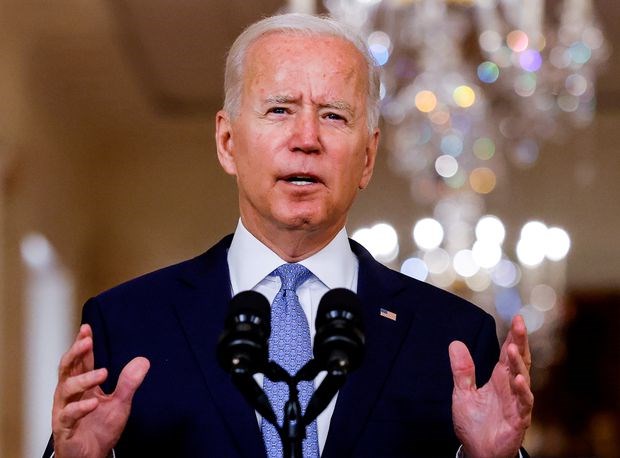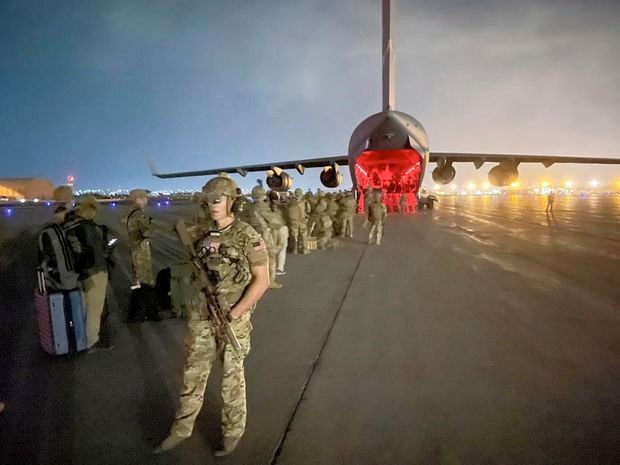
Wednesday September 1, 2021
By ADRIAN MORROW

U.S. President Joe Biden delivers remarks on Afghanistan during a speech in the State Dining Room at the White House in Washington, U.S., on Aug. 31, 2021. CARLOS BARRIA/REUTERS
President Joe Biden is vowing that the U.S. will never again use its military to impose regime change abroad, as he sought to slam shut the door on the Afghanistan War a day after pulling out his country’s last troops.
In a defiant White House address Tuesday, Mr. Biden defended the chaotic retreat from Kabul – arguing that prolonging the withdrawal would have put American troops in unacceptable danger – and lamented the enormous cost in lives and money of a failed war.
In future, he said, the U.S. will only take part in “targeted, precise” military operations to protect its own immediate interests, such as using air strikes to kill accused terrorists. Costly, open-ended occupations have served only to weaken the country against adversaries such as Russia and China, he contended.
“This decision about Afghanistan is not just about Afghanistan. It is about ending an era of major military operations to remake other countries,” a fired-up Mr. Biden said. “We’ve been a nation too long at war.”
The President touted the airlift of more than 120,000 people from Afghanistan as an “extraordinary success,” despite widespread criticism that the lack of U.S. planning led to deadly crushes of people at Kabul’s airport, where a suicide bomber also killed more than 170 Afghans and 13 U.S. troops last week.
Any failures, Mr. Biden said, were the fault of “corruption and malfeasance” in an Afghan government that collapsed in the face of a Taliban offensive faster than the U.S. had expected. He also blamed former president Donald Trump, who he said had not secured enough concessions from the Taliban in exchange for the U.S. pulling out. Even so, Mr. Biden argued, it was better to retreat than to keep a losing conflict going even a day longer.
“I was not going to extend this forever war, and I was not extending this forever exit,” the President said. “To those asking for a third decade of war in Afghanistan I ask: ‘What is the vital national interest?’”
The 20-year war was the U.S.’s longest. It began as an operation to hunt down the al-Qaeda masterminds of the Sept. 11, 2001, attacks but quickly morphed into an effort to build a Western-style democratic government in Afghanistan. The U.S.-led coalition, however, failed to stamp out the Taliban, which quickly overran the country earlier this month ahead of the U.S. pullout. Other allies had already left years earlier; Canada ended its 13-year involvement in the war in 2014.
The Biden administration has pledged to remain engaged with Afghanistan, possibly through the delivery of aid. But with authoritarian theocrats now in control of the country, it is unclear exactly how that would happen.

Paratroopers assigned to the 82nd Airborne Division, and others, prepare to board a C-17 cargo plane at Hamid Karzai International Airport in Kabul, Afghanistan, on Aug. 30, 2021. MASTER SGT. ALEXANDER BURNETT/THE ASSOCIATED PRESS
Most immediately, the retreat left as many as 200 U.S. citizens – plus thousands of Afghans who worked for the U.S. and its allies – stranded in Afghanistan. Many were either unable to get through Taliban checkpoints to reach the Kabul airport, or did not have their exit papers processed by Western governments in time.
Yaqub Zargarpur, chairman of the board at the Dar Al-Noor Mosque near Washington, said some of his relatives who worked as interpreters for coalition governments have been unable to leave Afghanistan. One cousin and his family, for instance, were en route to the airport when the suicide bomber struck. They had to turn back. The family has remained in contact with U.S. authorities, who are trying to help them find another way to leave.
“They are stuck there and can’t get out,” said Mr. Zargarpur, who himself came to the U.S. as a refugee in 1982. “It’s rocky and hard and difficult and heartbreaking.”
Dar Al-Noor has been helping the tens of thousands of Afghan evacuees entering the U.S., most of them landing at Dulles International Airport before being taken to military bases for processing. The mosque has provided clothing, halal food and volunteer doctors, and is now working to find homes for the newcomers.
Such efforts were sorely needed, Mr. Zargarpur said: The airlift was so sudden that the U.S. government didn’t have many of these logistical matters organized ahead of time.
“It was a shock to the system at the beginning,” Mr. Zargarpur said. “The majority of people coming in are arriving with only the clothes on their backs.”
Gordon Adams, who worked at the White House in the 1990s as a national-security budget official, said the Biden administration’s evacuation efforts deserve some understanding. In 1994, he recalled, it took a full nine months for the White House to prepare an operation to reinstate then-Haitian president Jean-Bertrand Aristide. It does not appear Mr. Trump left Mr. Biden with any sort of plan on Afghanistan, he said, meaning there was not enough runway to get organized.
“I know how hard this is,” he said. “It takes a lot more time and they needed more information than they had.”
More broadly, Mr. Biden’s thinking on Afghanistan appears to be in line with the country’s political consensus. His Democrats have become increasingly skeptical of foreign military interventions, while Mr. Trump repudiated the actions of his Republican predecessor, George W. Bush, who launched both the invasions of Afghanistan and Iraq.
“Forcibly removing foreign regimes rarely works out well for either the population of the country or the intervenor,” said Patricia Sullivan, a national-security expert with the University of North Carolina at Chapel Hill. “Removing a brutal authoritarian regime in a country might seem like a humanitarian thing to do, but in a place with no state institutions for decades, there is no replacement that can stabilize the country.”